German actress Hanni Weisse (1892-1967) belonged to the great film divas of the early German silent film. She was able to maintain her stardom till the late 1920s.
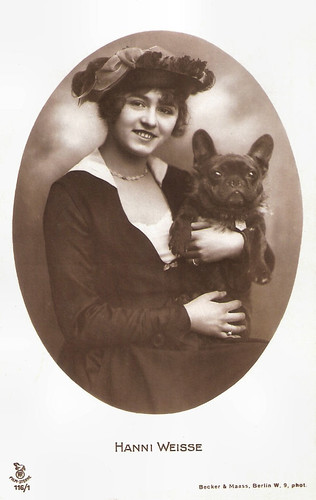
German postcard in the Film Sterne Series by Rotophot, no. 116/1, 1928-1929. Photo: Becker & Maas, Berlin.
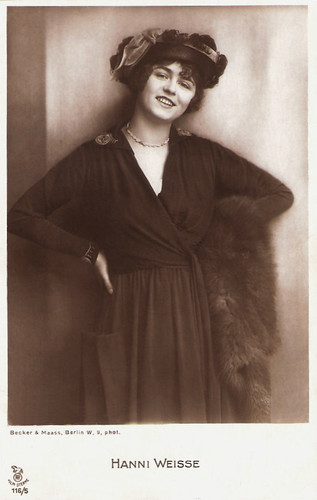
German postcard in the Film Sterne series by Rotophot, no. 116/5. Photo: Becker & Maass, Berlin.
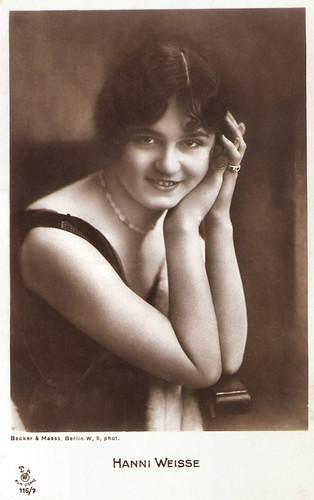
German postcard in the Film Sterne Series by Rotophot, no. 116/7, 1928-1929. Photo: Becker & Maas, Berlin.
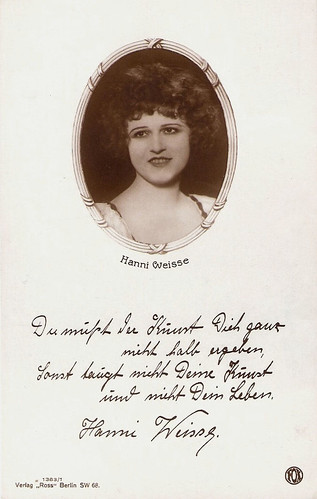
German postcard by Ross Verlag, no. 1383/1, 1927 -1928. Photo: Fox.
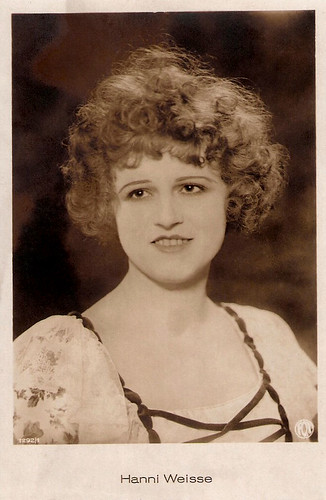
German postcard by Ross Verlag (?), no. 1292/1, 1927-1928. Photo: Fox. Probably the lower side of this card was cut off. The same photo was used for Ross card no. 1383/1.
Hanni Klara Therese Weisse was born in Chemnitz, Germany in 1892.
She studied to play the cello, but started her musical career in 1910 as a chorister at the Thalia-Theater in Berlin. In 1912 she was an ensemble member of the Royal Belvedere Dresden, which made a national tour through Germany.
In Berlin she had a chance meeting with film director Max Mack, who engaged her for the production company Vitascope. She made her film debut in his short Der Zigeunerin/The Gypsy (Max Mack, 1912) with Ernst Pittschau.
One of her first successes was Der Andere/The Other (Max Mack, 1913), starring Albert Bassermann, which according to critics belonged to the first art films.
In the following years she appeared in many great productions like Das Eiserne Kreuz/The Iron Cross (Richard Oswald, 1914), Anita Jo (Dimitri Buchowetzki, 1919), Die Apachen/The Apaches (Ewald André Dupont, 1919), Alkohol/Alcohol (Ewald André Dupont, Alfred Lind, 1920) and the horror film Der Graf von Cagliostro/The Count of Cagliostro (Reinhold Schünzel, 1920) starring Anita Berber and Conrad Veidt.
She was also playing in the very popular Sherlock Holmes films such as Der Hund von Baskerville/The Hound of the Baskervilles (Rudolf Meinert, 1914) and Das dunkle Schloß/The Dark Castle (Willy Zeyn, 1915).
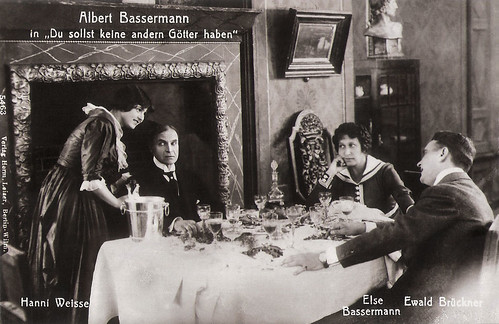
German postcard by Verlag Hermann Leiser, Berlin-Wilm., no. 5463. Photo: publicity still for Du sollst keine andern Götter haben/Thou shalt have no other gods (Adolf Gärtner, 1917) with Albert Bassermann, Hanni Weisse, Else Bassemann and Ewald Brückner.
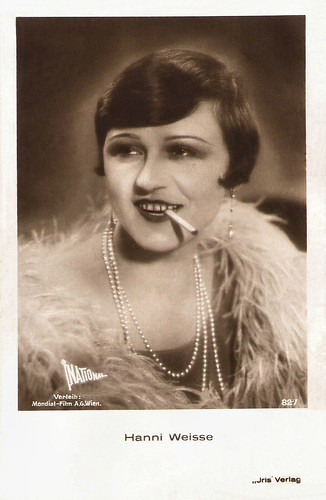
Austrian postcard by Iris Verlag, no. 827. Photo: National / Mondial-Film A.G., Wien.
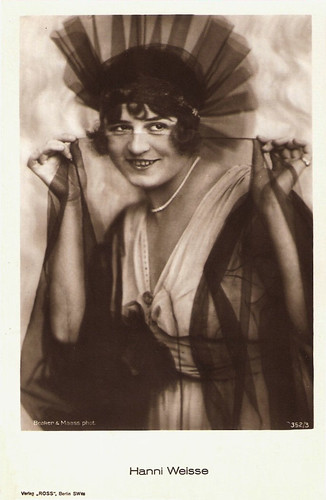
German postcard by Ross Verlag, no. 352/3, 1919-1924. Photo: Becker & Maass.
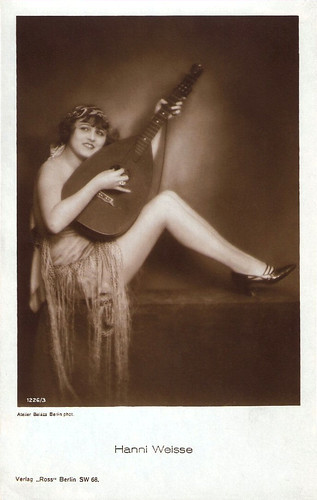
German postcard by Ross Verlag, no. 1226/3, 1927-1928. Photo: Atelier Balázs, Berlin.
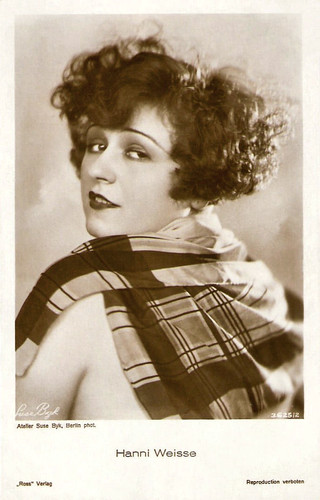
German Postcard by Ross Verlag, no. 3625/2, 1928-1929. Photo: Atelier Suse Byk, Berlin.
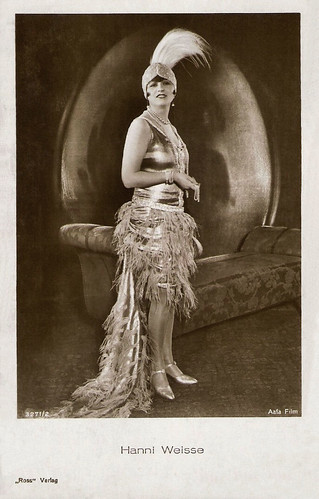
German postcard by Ross Verlag, no. 3271/2, 1928-1929. Photo: Aafa Film.
In the 1920s Hanni Weisse was a very busy actress and played in films like Die Insel der Verschollenen/The Island of the Lost (Urban Gad, 1921), Nanon (Hanns Schwarz, 1924), Die Drei Portiermädel/The Three Porter Girls (Carl Boese, 1925), Le train sans yeux/Train Without Eyes (Alberto Cavalcanti, 1927), Männer vor der Ehe/Men Before Marriage (Constantin J. David, 1927) and Kaczmarek (Carl Wilhelm, 1928) with Ernst Verebes.
Her engagements in the 1930s became rarer, new faces were in demand. She had roles in short comedies and played small parts in Die Heilige und ihr Narr/The Saint and Her Fool (Hans Deppe, Paul May, 1935), Krach im Hinterhaus/Trouble Backstairs (Veit Harlan, 1936) and Sergeant Berry (Herbert Selpin, 1939) starring Hans Albers.
In 1942 she made her last film Vom Schicksal verweht/Blown Away By Fate (1942, Nunzio Malasomma) featuring Sybille Schmitz. After 127 films Hanni Weisse retired from show business.
In her later years she and her second husband managed hotel-restaurants and bars, first in Aussig and Dresden, and from 1948 on in Frankfurt a.M. Her hotel-restaurant Zum Heidelberger became a popular meeting place there for artists.
Hanni Weisse died in 1967 in Bad Liebenzell, Germany. Her first marriage was to scriptwriter Bobby E. Lüthge, who wrote the scripts for her films Mater dolorosa (1924), Der Kavalier vom Wedding (1927) and Kaczmarek (1928) .
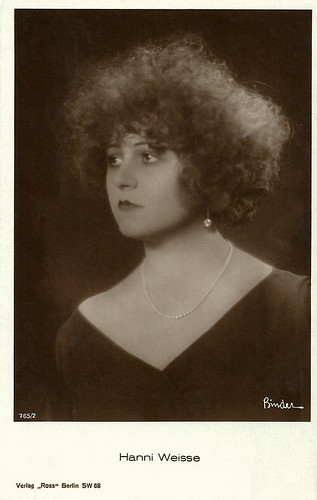
German postcard by Ross Verlag, no. 765/2, 1925-1926. Photo: Alex Binder.
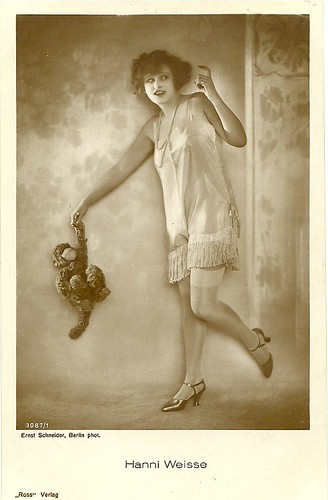
German postcard by Ross Verlag, no. 3087/1, 1928-1929. Photo: Ernst Schneider, Berlin.
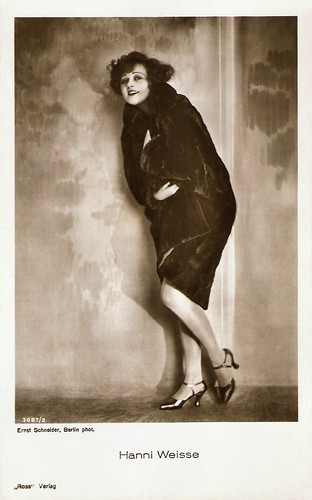
German postcard by Ross Verlag, no. 3087/2, 1928-1929. Photo: Ernst Schneider, Berlin.
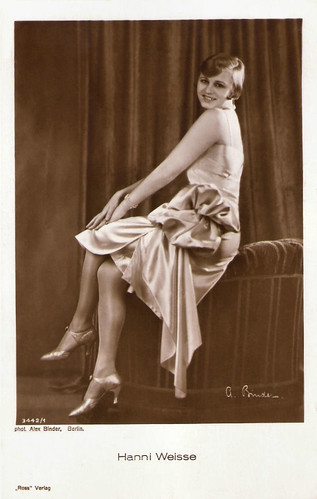
German postcard by Ross Verlag, no. 3442/1, 1928-1929. Photo: Alex Binder, Berlin.
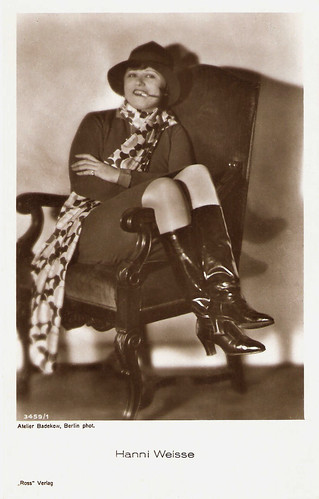
German postcard by Ross Verlag, no. 3459/1, 1928-1929. Photo: Atelier Badekow Berlin.
Sources: Thomas Staedeli (Cyranos), Filmportal.de, Wikipedia (German) and IMDb.

German postcard in the Film Sterne Series by Rotophot, no. 116/1, 1928-1929. Photo: Becker & Maas, Berlin.

German postcard in the Film Sterne series by Rotophot, no. 116/5. Photo: Becker & Maass, Berlin.

German postcard in the Film Sterne Series by Rotophot, no. 116/7, 1928-1929. Photo: Becker & Maas, Berlin.

German postcard by Ross Verlag, no. 1383/1, 1927 -1928. Photo: Fox.

German postcard by Ross Verlag (?), no. 1292/1, 1927-1928. Photo: Fox. Probably the lower side of this card was cut off. The same photo was used for Ross card no. 1383/1.
Sherlock Holmes
Hanni Klara Therese Weisse was born in Chemnitz, Germany in 1892.
She studied to play the cello, but started her musical career in 1910 as a chorister at the Thalia-Theater in Berlin. In 1912 she was an ensemble member of the Royal Belvedere Dresden, which made a national tour through Germany.
In Berlin she had a chance meeting with film director Max Mack, who engaged her for the production company Vitascope. She made her film debut in his short Der Zigeunerin/The Gypsy (Max Mack, 1912) with Ernst Pittschau.
One of her first successes was Der Andere/The Other (Max Mack, 1913), starring Albert Bassermann, which according to critics belonged to the first art films.
In the following years she appeared in many great productions like Das Eiserne Kreuz/The Iron Cross (Richard Oswald, 1914), Anita Jo (Dimitri Buchowetzki, 1919), Die Apachen/The Apaches (Ewald André Dupont, 1919), Alkohol/Alcohol (Ewald André Dupont, Alfred Lind, 1920) and the horror film Der Graf von Cagliostro/The Count of Cagliostro (Reinhold Schünzel, 1920) starring Anita Berber and Conrad Veidt.
She was also playing in the very popular Sherlock Holmes films such as Der Hund von Baskerville/The Hound of the Baskervilles (Rudolf Meinert, 1914) and Das dunkle Schloß/The Dark Castle (Willy Zeyn, 1915).

German postcard by Verlag Hermann Leiser, Berlin-Wilm., no. 5463. Photo: publicity still for Du sollst keine andern Götter haben/Thou shalt have no other gods (Adolf Gärtner, 1917) with Albert Bassermann, Hanni Weisse, Else Bassemann and Ewald Brückner.

Austrian postcard by Iris Verlag, no. 827. Photo: National / Mondial-Film A.G., Wien.

German postcard by Ross Verlag, no. 352/3, 1919-1924. Photo: Becker & Maass.

German postcard by Ross Verlag, no. 1226/3, 1927-1928. Photo: Atelier Balázs, Berlin.

German Postcard by Ross Verlag, no. 3625/2, 1928-1929. Photo: Atelier Suse Byk, Berlin.

German postcard by Ross Verlag, no. 3271/2, 1928-1929. Photo: Aafa Film.
Busy Actress
In the 1920s Hanni Weisse was a very busy actress and played in films like Die Insel der Verschollenen/The Island of the Lost (Urban Gad, 1921), Nanon (Hanns Schwarz, 1924), Die Drei Portiermädel/The Three Porter Girls (Carl Boese, 1925), Le train sans yeux/Train Without Eyes (Alberto Cavalcanti, 1927), Männer vor der Ehe/Men Before Marriage (Constantin J. David, 1927) and Kaczmarek (Carl Wilhelm, 1928) with Ernst Verebes.
Her engagements in the 1930s became rarer, new faces were in demand. She had roles in short comedies and played small parts in Die Heilige und ihr Narr/The Saint and Her Fool (Hans Deppe, Paul May, 1935), Krach im Hinterhaus/Trouble Backstairs (Veit Harlan, 1936) and Sergeant Berry (Herbert Selpin, 1939) starring Hans Albers.
In 1942 she made her last film Vom Schicksal verweht/Blown Away By Fate (1942, Nunzio Malasomma) featuring Sybille Schmitz. After 127 films Hanni Weisse retired from show business.
In her later years she and her second husband managed hotel-restaurants and bars, first in Aussig and Dresden, and from 1948 on in Frankfurt a.M. Her hotel-restaurant Zum Heidelberger became a popular meeting place there for artists.
Hanni Weisse died in 1967 in Bad Liebenzell, Germany. Her first marriage was to scriptwriter Bobby E. Lüthge, who wrote the scripts for her films Mater dolorosa (1924), Der Kavalier vom Wedding (1927) and Kaczmarek (1928) .

German postcard by Ross Verlag, no. 765/2, 1925-1926. Photo: Alex Binder.

German postcard by Ross Verlag, no. 3087/1, 1928-1929. Photo: Ernst Schneider, Berlin.

German postcard by Ross Verlag, no. 3087/2, 1928-1929. Photo: Ernst Schneider, Berlin.

German postcard by Ross Verlag, no. 3442/1, 1928-1929. Photo: Alex Binder, Berlin.

German postcard by Ross Verlag, no. 3459/1, 1928-1929. Photo: Atelier Badekow Berlin.
Sources: Thomas Staedeli (Cyranos), Filmportal.de, Wikipedia (German) and IMDb.
2 comments:
Another beautiful actress. SHe's so adorable!~a
It's a pity I couldn't find any clips of her films. I am curious how she was on the screen. Greetings from Amsterdam.
Post a Comment